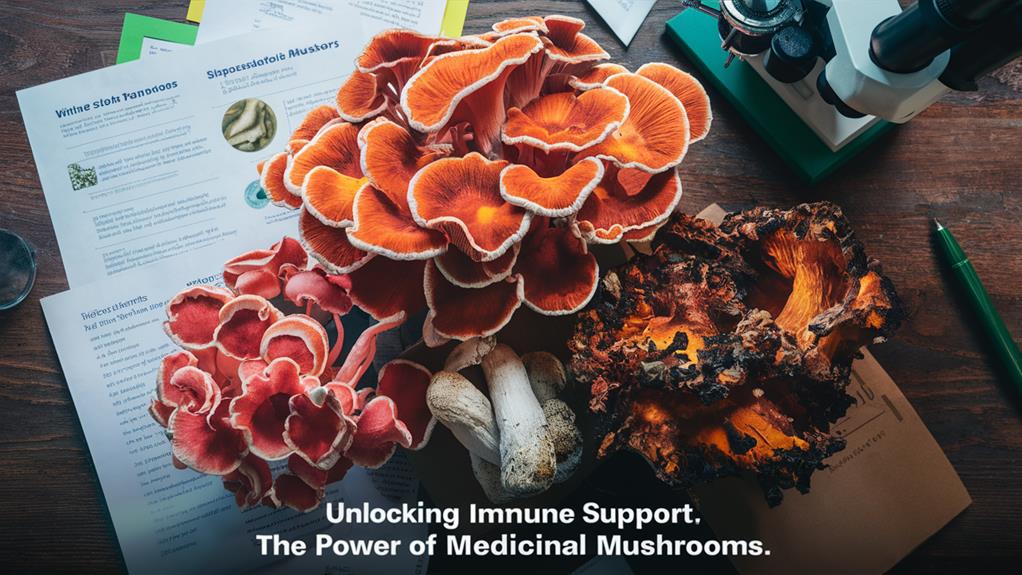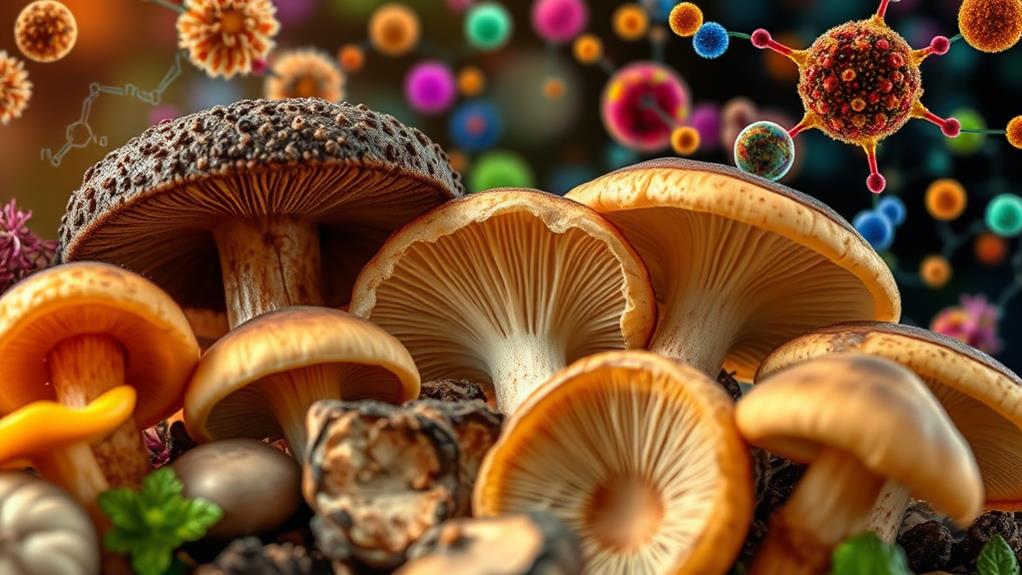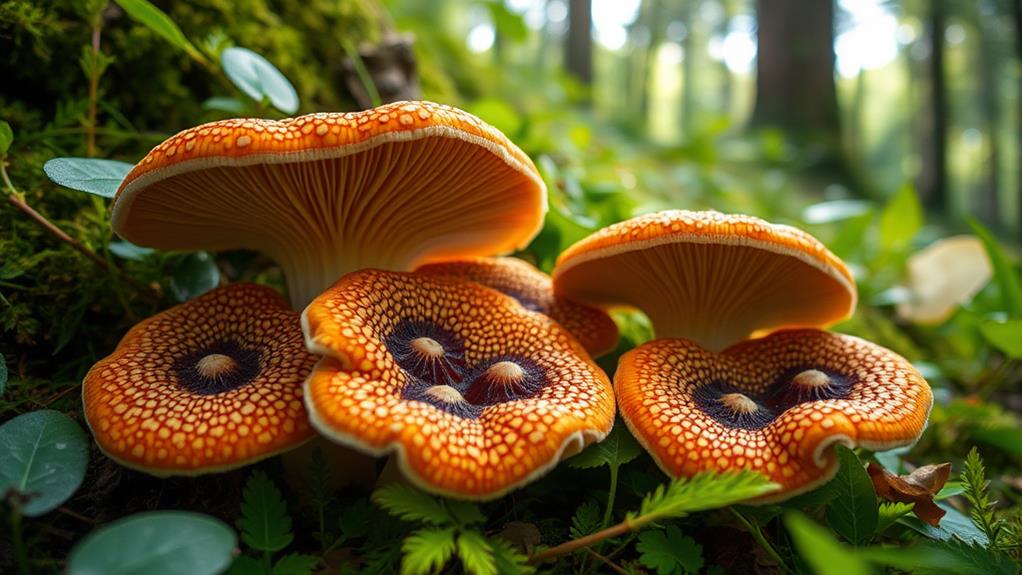
Medicinal mushrooms, like turkey tail and reishi, have been used for centuries to support immune health. They contain bioactive compounds such as polysaccharides and triterpenes, which can boost your immune response. For example, turkey tail mushrooms are linked to improved survival rates in cancer patients, enhancing overall immune function during treatments. Research shows these mushrooms can activate immune cells and increase crucial cytokine production. Incorporating mushrooms into your diet, whether fresh or in supplements, can help strengthen your defenses. If you're curious about how to include these mushrooms in your daily life, there's even more to explore.
Overview of Medicinal Mushrooms

Medicinal mushrooms are powerful allies in supporting your immune system. Among these, turkey tail mushrooms, known scientifically as Trametes versicolor, stand out for their remarkable health benefits. They contain polysaccharopeptides, such as PSK, which have been shown to enhance your immune response.
In Japan, turkey tail mushrooms are recognized for their effectiveness in cancer treatment, making them a crucial component of many patients' health regimens. Recent studies have demonstrated that over 2,000 studies in the last decade highlight the anticancer effects of medicinal mushrooms, reinforcing their role in immune support.
Research supports the idea that regular consumption of medicinal mushrooms can stimulate immune cell activity. They help boost natural killer (NK) cells and T-cells, which play essential roles in fighting infections and tumors.
Clinical studies demonstrate that incorporating turkey tail and other medicinal mushrooms into treatment plans can improve survival rates and the quality of life for cancer patients who are undergoing conventional therapies.
These mushrooms are also rich in bioactive compounds like beta-glucans, which are known for their immunomodulatory effects. By consuming medicinal mushrooms, you can help strengthen your body's defense mechanisms against diseases, making them an important addition to your wellness routine.
Explore the benefits of these potent fungi, and consider how they might fit into your journey toward better health.
Historical Significance and Use
For thousands of years, cultures around the world have harnessed the power of mushrooms for their health benefits. Medicinal mushrooms have played a vital role in traditional practices, especially in traditional Chinese medicine. Ancient texts highlight their use for promoting longevity and overall health.
Take Turkey tail, for instance. This mushroom has a rich history of use, recognized for its immune-supportive properties. It's been valued in various traditional medicine systems for its ability to enhance immune function.
Reishi mushrooms, known as the mushroom of immortality, are celebrated for their significant role in enhancing immune function and overall wellness. They also exhibit promising anti-cancer properties, making them a critical component in modern health approaches.
Reishi mushrooms also hold a significant place in history. Used since ancient times, they're celebrated for their potential to boost immune function and contribute to a long, healthy life. The medicinal properties of these mushrooms date back as far as 3000 BCE, showcasing their historical significance. Their antimicrobial and anti-inflammatory effects have made them a staple in numerous cultures.
Today, over 100 reishi-based products are available, underscoring their acceptance in modern medicine, particularly in countries like Japan and China, where they've gained clinical approval. This blend of ancient knowledge and modern research highlights the enduring importance of medicinal mushrooms in supporting health and well-being.
Key Bioactive Compounds

When you explore the world of medicinal mushrooms, you'll find that they contain powerful bioactive compounds that are vital for immune support.
These compounds, such as polysaccharides, triterpenes, and specific proteins, work together to enhance your immune response, making these mushrooms a valuable ally in your health journey.
Notably, polysaccharide-K (PSK) found in Turkey Tail mushrooms has been shown to boost immune cell activity, which is crucial during cancer treatments like chemotherapy enhancing immune function.
Understanding how these compounds function can help you appreciate their role in fighting off illnesses and promoting overall well-being.
Polysaccharides and Immune Modulation
Harnessing the power of polysaccharides, particularly beta-glucans, found in mushrooms like turkey tail (Trametes versicolor) can significantly enhance your immune response. These polysaccharides activate natural killer cells and T-cells, both of which are essential for fighting tumors and infections.
One of the most studied compounds in turkey tail is Polysaccharide-K (PSK), known for improving immune function and survival rates in various cancers, including gastric and colorectal cancers.
Research shows that polysaccharides from medicinal mushrooms stimulate cytokine production, which boosts both humoral and cellular immune responses. This process is particularly important in cancer immunotherapy, as stronger immune responses help your body combat cancer more effectively.
Additionally, other mushrooms, like Lentinus edodes (shiitake), have demonstrated the ability to enhance immune cell activity against cancer cells through direct cytotoxic effects.
The immunomodulatory effects of these polysaccharides also help regulate immune responses and reduce inflammation, making them valuable in integrative cancer treatment strategies.
Triterpenes and Antitumor Effects
Triterpenes, a powerful class of bioactive compounds found in medicinal mushrooms like Ganoderma lucidum, play a crucial role in combating cancer. These compounds have shown significant antitumor effects by inhibiting tumor cell growth and promoting apoptosis, or programmed cell death, in various cancer cells. Notably, ganoderic acids, a specific type of triterpene from reishi mushrooms, exhibit cytotoxic effects against multiple cancer types, highlighting their potential in cancer therapies.
Additionally, triterpenes can enhance immune responses by boosting the activity of natural killer cells and T-cells, which are essential for identifying and destroying cancer cells. This immune support is vital in the battle against tumors.
Moreover, triterpenes also help address chronic inflammation, a factor that can promote tumor growth. By reducing inflammation, they create a less favorable environment for cancer cells.
Research indicates that when combined with conventional cancer therapies, triterpenes may improve treatment outcomes. Their ability to enhance the efficacy of chemotherapeutic agents makes them valuable allies in fighting cancer.
With ongoing studies, the potential of triterpenes in oncology continues to grow, offering hope for better cancer management.
Proteins and Cytokine Activity
Medicinal mushrooms are packed with proteins that significantly boost immune responses, complementing the effects of triterpenes in cancer therapy.
These proteins, especially fungal immunomodulatory proteins (FIPs), activate important immune cells like T cells and natural killer (NK) cells, enhancing your body's defense. One standout example is Polysaccharide K (PSK) from turkey tail mushrooms, which stimulates the release of cytokines, particularly T1 cytokines that support anti-tumor immunity.
Research shows that mushrooms can increase cytokines such as TNF-α, crucial for immune regulation and tumor clearance. However, it's important to note that the effects can differ in lab studies compared to real-life scenarios.
Compounds like lentinan, found in shiitake mushrooms, also stimulate T and NK cell production, boosting your immune response against cancer.
Moreover, the unique structures of mushroom-derived proteins and polysaccharides influence their biological activities. This means they can effectively modulate cytokine patterns and support overall immune functions.
Immune Modulation Mechanisms
When you explore the immune modulation mechanisms of medicinal mushrooms, you'll find they play a vital role in enhancing your body's defenses.
These mushrooms can boost cytokine production, activate immune cells, and help clear cancer more effectively.
Cytokine Production Enhancement
How do medicinal mushrooms enhance cytokine production to support immune function?
Medicinal mushrooms, like Turkey Tail (Trametes versicolor), play a significant role in boosting cytokine production, which is essential for a strong immune response. Research shows that polysaccharopeptides from Turkey Tail stimulate the release of cytokines, activating T-cells and natural killer (NK) cells. These immune cells are crucial in defending your body against infections and even cancer.
Lentinan, a compound found in shiitake mushrooms (Lentinus edodes), also enhances cytokine production. This increase in cytokines not only strengthens your overall immune response but also helps in destroying tumor cells.
Studies indicate that these mushrooms lead to a rise in pro-inflammatory cytokines, which are vital for effective immune system functioning, especially against tumors.
Additionally, variability in cytokine responses has been observed, with mushrooms boosting TNF-α production in both lab and live studies. This underscores their potential in cancer therapy through immune modulation.
Immune Cell Activation
Immune cells play a vital role in defending your body against various diseases, and medicinal mushrooms are powerful allies in their activation. These mushrooms, like turkey tail and shiitake, contain compounds called polysaccharides that boost your immune cell activation.
For instance, polysaccharopeptides such as PSK enhance the response of natural killer (NK) cells and T-cells, which are crucial for fighting off cancer cells. When you consume these mushrooms, they stimulate the release of cytokines, helping your immune system recognize and attack tumors more effectively.
Lentinan, found in shiitake mushrooms, is known to improve the production of T and NK cells, contributing to a stronger immune response. Additionally, reishi mushrooms activate various immune cells, including macrophages and dendritic cells, through a specific signaling pathway, increasing their ability to combat cancer.
Research shows that the immune-modulating effects of mushrooms can lead to reduced tumor growth and improved survival rates. Clinical trials indicate that patients taking PSK alongside chemotherapy experience better immune function and outcomes.
Cancer Clearance Promotion
Medicinal mushrooms not only activate immune cells but also play a significant role in cancer clearance through their immune modulation mechanisms. By incorporating these mushrooms into your health routine, you can support your immune system's fight against cancer.
For instance, turkey tail mushrooms, rich in polysaccharides like polysaccharide K (PSK), have shown remarkable results in clinical trials. They can improve survival rates in colorectal cancer patients, achieving an 86.8% survival rate compared to 60% in control groups.
Other mushrooms, like reishi and maitake, also enhance immune function by activating various immune cells and increasing cytokine production. This boost is crucial for effective cancer treatments and helps in combating tumor growth.
Clinical trials demonstrate that adding PSK to treatment regimens significantly reduces recurrence rates in gastric and colorectal cancer patients, emphasizing the importance of immune modulation during and after chemotherapy.
Turkey Tail and PSK Research

Exploring the potential of turkey tail mushrooms (Trametes versicolor) reveals their significant role in cancer treatment, primarily through the active compound polysaccharide-K (PSK). This powerful substance has gained attention, especially in Japan, where it's been recognized for its ability to support the immune system.
PSK boosts the activity of natural killer cells and T-cells, which are vital for fighting tumors. Research shows that patients with colorectal cancer who received PSK alongside chemotherapy experienced higher survival rates and lower recurrence rates compared to those who only had chemotherapy.
In lung cancer studies, those treated with PSK also showed improved overall survival and quality of life, supported by five nonrandomized trials. A meta-analysis involving 8,009 patients confirmed that including PSK in cancer treatment regimens correlates with improved survival rates, particularly in breast, gastric, and colorectal cancers.
These findings highlight the importance of turkey tail and polysaccharide-K in enhancing immune support and improving outcomes for cancer patients. As research continues, the potential benefits of turkey tail mushrooms in cancer treatment could become even more significant.
Clinical Trials in Cancer Treatment
When it comes to cancer treatment, PSK from turkey tail mushrooms shows promising results in clinical trials.
Research has found that it not only boosts immune function but also improves survival rates for patients battling various types of cancer.
PSK Efficacy in Cancer
Among the promising natural therapies in cancer treatment, Polysaccharide-K (PSK) stands out for its significant impact on patient outcomes. Derived from the turkey tail mushroom, PSK has shown remarkable effectiveness in improving survival rates among cancer patients. For instance, in cases of colorectal cancer, studies have reported that survival rates increased from 60% to an impressive 86.8% for patients in stages II and III when treated with PSK.
Clinical trials also indicate that PSK enhances immune function by activating natural killer cells and T-cells, crucial components of your body's defense against tumors. This immune activation is particularly beneficial for lung cancer patients, as those receiving PSK alongside standard therapies experienced better survival and quality of life.
Furthermore, research on gastric cancer has revealed that PSK helps repair immune cell damage caused by chemotherapy, leading to improved overall survival rates and lower recurrence. A comprehensive meta-analysis that included over 8,000 participants confirmed that using PSK is linked with better survival rates across various cancer types, such as gastric, breast, and colorectal cancers.
With these findings, PSK emerges as a powerful ally in the fight against cancer.
Immune Function Enhancement
Building on the significant findings related to PSK's efficacy in cancer treatment, research increasingly highlights the role of immune function enhancement in improving patient outcomes.
Polysaccharide-K (PSK), derived from turkey tail mushrooms, shows promising results, especially for patients battling lung cancer and other types. Here are some key points to consider:
- Immune Boost: PSK enhances immune response, making it easier for your body to fight cancer cells.
- Chemotherapy Support: This compound may repair immune cell damage caused by chemotherapy, helping you recover better.
- Survival Rates: Clinical studies indicate improved survival rates in colorectal and lung cancer patients receiving PSK alongside standard treatments.
- Quality of Life: In nonrandomized trials, lung cancer patients reported better quality of life and immune function with PSK treatment.
These findings suggest that incorporating PSK into cancer treatment could be a game-changer.
As researchers continue to explore its benefits, PSK stands out as a promising ally in the fight against cancer, providing hope for enhanced immune function and overall well-being.
Survival Rate Improvements
The impressive survival rate improvements linked to Polysaccharide-K (PSK) from turkey tail mushrooms make it a noteworthy consideration in cancer treatment. Clinical trials reveal that PSK significantly boosts survival rates in stage II and III colorectal cancer patients. In one study, survival increased from 60% in the control group to an amazing 86.8% in those taking PSK.
This isn't just a fluke—meta-analyses involving over 8,000 cancer patients show that PSK correlates with better survival rates across several cancers, including breast and gastric.
Moreover, lung cancer studies indicate that patients receiving PSK alongside traditional treatments enjoy enhanced overall survival and improved quality of life. PSK doesn't just help with longevity; it also repairs immune cell damage caused by chemotherapy, particularly in gastric cancer patients.
Randomized studies consistently confirm that PSK enhances immune function, which plays a crucial role in increasing survival rates and reducing recurrence in colorectal cancer patients undergoing chemotherapy. Given these findings, incorporating turkey tail mushrooms and their active compound, PSK, into cancer treatment regimens is a promising avenue for improving patient outcomes and survival rates.
Safety and Regulatory Considerations

When considering the use of medicinal mushrooms for immune support, safety and regulatory aspects can't be overlooked. The FDA regulates dietary supplements like mushrooms differently than pharmaceuticals, which can lead to variations in quality and effectiveness.
Here are some important points to keep in mind:
- Polysaccharide-K (PSK), found in turkey tail mushrooms, has shown promise in studies, especially in Japan for cancer treatment, but it's not FDA-approved in the U.S.
- While few side effects have been reported, it's crucial to approach mushroom supplements cautiously, as safety isn't guaranteed without proper oversight.
- Always check the quality and sourcing of mushroom products, since the lack of regular FDA review means that not all supplements meet high standards.
- Before you start taking any mushroom supplements, consult healthcare professionals, especially if you're receiving conventional cancer treatments, to avoid potential interactions.
Integrating Mushrooms in Cancer Care
Integrating medicinal mushrooms into cancer care is increasingly recognized as a promising strategy for bolstering immune response and enhancing treatment outcomes.
These mushrooms, like turkey tail (Trametes versicolor), contain vital compounds such as Polysaccharide-K (PSK), which have shown significant efficacy in supporting cancer patients. Clinical studies reveal that PSK not only boosts immune support but also improves survival rates during chemotherapy. For instance, colorectal cancer patients taking PSK had an impressive survival rate of 86.8%, compared to just 60% in those who didn't.
Moreover, reishi (Ganoderma lucidum) and maitake (Grifola frondosa) mushrooms possess remarkable immunomodulatory properties, enhancing the activity of immune cells that fight cancer.
In lung cancer trials, patients receiving PSK alongside standard treatments reported a better quality of life and longer survival. This is supported by multiple nonrandomized studies and a meta-analysis involving over 8,000 patients.
Future Research Directions

Exploration of future research directions for medicinal mushrooms opens up exciting possibilities for enhancing immune support in cancer care.
You can expect intriguing developments as researchers delve deeper into this area. Here are four key focus points for upcoming studies:
- Clinical Trials: More randomized, controlled trials are essential to validate the effects of various mushroom species on immune support in human populations.
- Polysaccharides: Investigating the mechanisms of action of bioactive compounds, especially polysaccharides, will help clarify their role in enhancing immune function.
- Synergistic Effects: Studies should examine the benefits of combining different mushroom species in integrated cancer therapy, which could optimize immune response and improve treatment outcomes.
- Delivery Methods: Identifying the most effective dosages and delivery methods for mushroom extracts is crucial to maximize their immunomodulatory benefits.
Practical Tips for Consumption
As research into medicinal mushrooms continues to expand, you can easily incorporate these powerful fungi into your daily routine for immune support. Start by adding a variety of mushroom types like shiitake, maitake, and turkey tail to your meals.
These mushroom varieties contain bioactive compounds that enhance immune function and offer numerous health benefits. Aim to consume at least 18 grams daily, as studies suggest this amount can reduce cancer risk and support your overall health.
You can enjoy mushrooms in different forms, including fresh, dried, or powdered. Try making mushroom teas or taking capsules, adapting to what you prefer.
Enhance your savory dishes with mushrooms, which are low in sodium and can boost flavor without adding extra salt.
Don't forget about vitamin D! Consider including UV-exposed mushrooms like white button and portabella, which can help regulate your immune system while improving your overall wellness.
Conclusion
In conclusion, medicinal mushrooms offer fascinating immune support benefits that can be a game-changer for health. For instance, research shows that Turkey Tail mushrooms can improve immune response in up to 70% of cancer patients. This highlights the powerful role these fungi can play in our well-being. As more studies unfold, integrating mushrooms into your diet could enhance your health. So, why not explore these natural wonders and see how they might benefit you?
